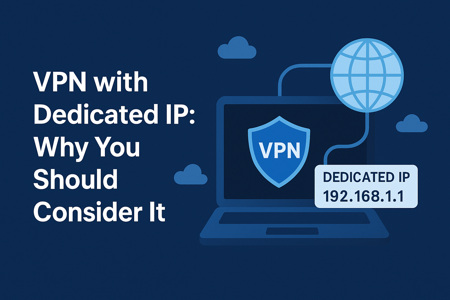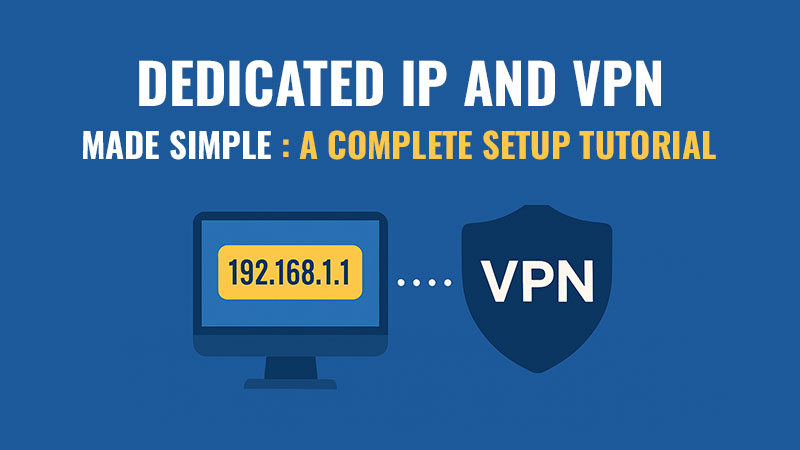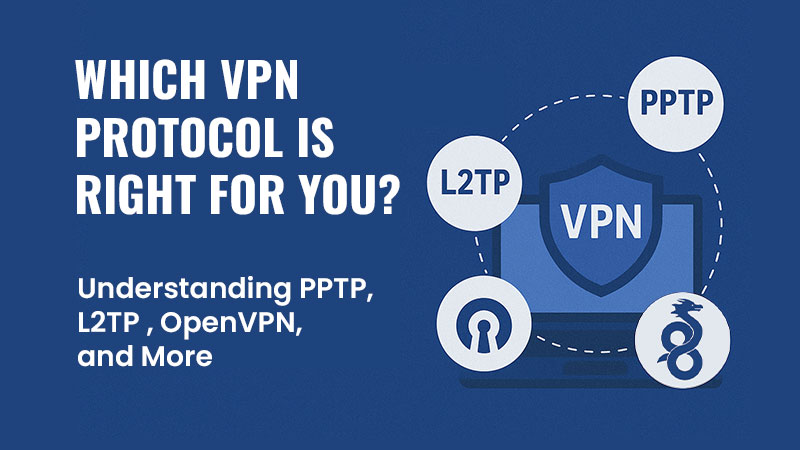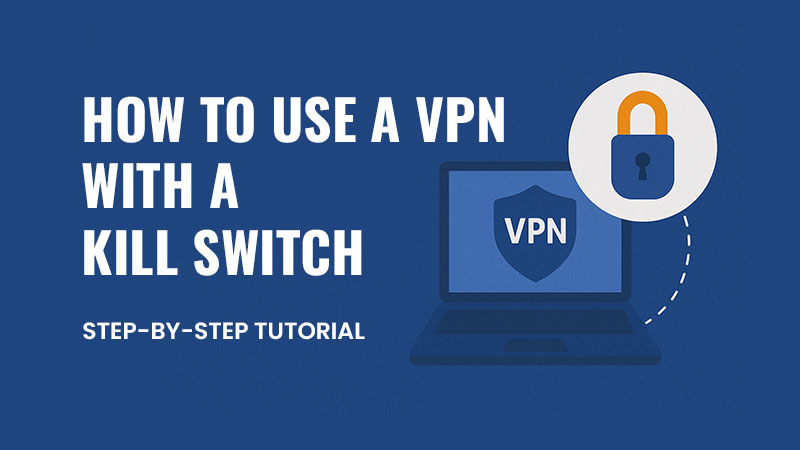securing your online activities and maintaining privacy is more important than ever. Every time you connect to the internet, your personal data, browsing habits, and location can potentially be tracked, logged, or even exploited. Whether you’re working remotely, streaming content, managing sensitive information, or simply browsing, the risks of cyber threats, data breaches, and privacy invasion are growing rapidly. This is where Virtual Private Networks (VPNs) become essential tools. VPNs not only encrypt your data to protect it from hackers but also allow you to access restricted or geo-blocked content by masking your real IP address. However, if you’re looking to elevate your VPN experience even further, using a Dedicated IP can unlock additional security and usability advantages that a shared IP simply can’t provide. This guide breaks down everything you need to know about De
Table of Contents
ToggleWhat Is a Dedicated IP?
A Dedicated IP (Internet Protocol address) is a unique IP address assigned exclusively to you by your VPN provider. Unlike shared IPs, which are used by multiple VPN users, a Dedicated IP is reserved for your sole use.
When using a shared VPN IP, you are typically grouped with hundreds or even thousands of other users who are all connecting through the same address. This can sometimes cause problems like frequent captcha requests, website bans, or unstable connections because websites may flag shared IPs as suspicious due to high traffic volumes from multiple users. With a Dedicated IP, however, you bypass these issues because the IP is assigned to you alone, offering more stable and trusted access.
A Dedicated IP is particularly useful for people who need reliable access to specific websites, business systems, or online services that require consistent IP recognition. It is also an excellent solution for users who need to set up secure remote access to home networks, company servers, or private databases, since these can be configured to accept connections only from a specific, known IP address.
Additionally, having a Dedicated IP can improve your online reputation and reduce the likelihood of being mistakenly identified as a malicious user, a common issue when using shared IPs.
Key Benefits of a Dedicated IP:
- Consistent Access: With a Dedicated IP, you experience uninterrupted and reliable access to websites, online services, and corporate platforms. Websites are less likely to block you, as they can easily recognize and trust the consistent IP address.
- Better Security: A Dedicated IP significantly enhances security. It allows you to set up IP-based authentication systems, meaning only your unique IP can access sensitive data, private servers, or restricted business networks. This adds an extra layer of protection against unauthorized users.
- Reduced Captchas: Frequent CAPTCHA challenges can be frustrating, especially when using shared VPN IPs that trigger security systems. A Dedicated IP reduces the chance of running into these interruptions, providing a smoother and more efficient browsing experience.
- Improved Email Deliverability: When sending emails through a Dedicated IP, you reduce the risk of your messages being flagged as spam. Shared IPs may get blacklisted due to the activities of other users, but with a Dedicated IP, your email reputation remains in your control.
- Secure Remote Access: Dedicated IPs are ideal for securely connecting to home or business networks from remote locations. They allow you to create access policies that restrict entry to only your known IP, adding a powerful layer of defense against cyber intrusions.
- Better Online Banking Experience: Financial platforms often flag logins from varying IP addresses as suspicious. A Dedicated IP helps you maintain a consistent login location, reducing the chances of security alerts or blocked transactions.
- Custom Server Configuration: If you manage websites or databases, a Dedicated IP allows you to configure secure server connections that specifically recognize your IP, providing better control and protection over your digital assets.
VPN with Dedicated IP: Why You Should Consider It

Integrating a Dedicated IP with your VPN subscription transforms your online experience from simply secure to reliably seamless and personalized. While a standard VPN connection already encrypts your data and hides your location, a Dedicated IP adds an exclusive digital identity that unlocks advanced use cases and improved performance.
- Enhanced Trust and Reputation: Many websites, online services, and corporate networks use IP reputation scoring to flag suspicious activity. With a Dedicated IP, your address is less likely to be blacklisted or flagged, since it has a consistent usage history only tied to you. This builds trust with services like e-commerce platforms, email providers, and financial institutions.
- Access to Enterprise Resources: Businesses often restrict access to internal tools and servers by whitelisting specific IPs. A Dedicated IP allows remote employees and contractors to securely connect to company resources (VPN, databases, intranet) without the hassle of dynamic address changes or manual reconfiguration.
- Optimized Streaming and Gaming: Shared VPN IPs can become congested with heavy traffic, leading to buffering, lag, or connection drops. A Dedicated IP server typically has lighter load, offering faster speeds and lower latency—ideal for streaming your favorite shows or gaming on international servers without interruptions.
- Advanced Compliance and Audit Trails: For industries with strict regulatory requirements (such as finance, healthcare, or legal), using a Dedicated IP ensures that all access events originate from a verifiable address. This simplifies compliance audits, forensic investigations, and access logs review.
- Custom Firewall and DNS Rules: A Dedicated IP empowers you to create granular firewall rules, DNS policies, or port forwarding settings tailored to that address. Whether hosting a private web server, VoIP system, or IoT devices, you gain full control over what traffic is allowed in and out.
- Reduced False Positives: Shared IPs often trigger multi-factor authentication or extra security checks because of simultaneous logins from different locations. With a Dedicated IP, services recognize your consistent endpoint, reducing login friction and false security alerts.
By choosing a VPN plan with a Dedicated IP, you’re not just encrypting your traffic—you’re investing in a bespoke, high-performance network identity that enhances security, usability, and professional-grade connectivity.## Step-By-Step Tutorial: Setting Up a Dedicated IP with Your VPN
Step 1: Choose a VPN Provider That Offers Dedicated IPs
Look for reputable VPN services that specifically offer Dedicated IP options. Some popular providers include:
- NordVPN
- CyberGhost
- PureVPN
- Private Internet Access
Step 2: Purchase a Dedicated IP Add-On
Most VPN services offer Dedicated IPs as a premium add-on. Select your desired IP location during checkout for optimal performance (e.g., US, UK, Germany).
Step 3: Download and Install the VPN App
Follow your provider’s instructions to install the VPN app on your device (Windows, macOS, Android, iOS, etc.).
Step 4: Log In and Connect to Your Dedicated IP
Once logged in:
- Go to the server list.
- Select the Dedicated IP server provided to you.
- Connect and start browsing securely.
Step 5: Configure Optional Settings
Depending on your needs, you can:
- Enable Kill Switch for added security.
- Set up Split Tunneling to choose which apps use the VPN.
- Adjust DNS settings for faster or more secure browsing.
Step 6: Test Your Connection
Visit websites like whatismyip.com to verify your Dedicated IP is active. You can also run speed and leak tests to ensure your setup is working correctly.
Quick Tips for Optimizing Your Dedicated IP VPN
- Choose Nearby Servers: To achieve faster speeds and reduced latency.
- Regularly Update the VPN App: Stay protected with the latest security patches.
- Use Strong Passwords: Especially for VPN accounts tied to a Dedicated IP.
- Monitor Your IP Reputation: Tools like MXToolbox can help check if your IP is blacklisted.
Final Thoughts
As cyber threats evolve and online privacy becomes an ever-growing concern, leveraging a VPN with a Dedicated IP is one of the most effective strategies for bolstering your digital defenses. By combining strong encryption with an exclusive, personal IP address, you gain unmatched consistency, trustworthiness, and control over your online presence.
Throughout this tutorial, you’ve learned:
- The fundamentals of Dedicated IPs: What they are, how they differ from shared IPs, and why they matter for both personal and professional use.
- Key benefits you can’t overlook: From reduced captchas and improved email deliverability to enterprise-grade security and compliance support.
- How to get started: A clear, step-by-step process for purchasing, installing, and configuring your VPN client with a Dedicated IP.
- Pro tips for optimization: Simple adjustments like choosing the right server location, enabling advanced settings (Kill Switch, Split Tunneling), and monitoring your IP reputation to ensure peak performance.
Boost your online security today don’t wait to stay protected. Whether you’re safeguarding sensitive business data, enjoying buffer-free streaming, or maintaining seamless remote access, a VPN with a Dedicated IP offers the reliability and peace of mind you need.
Take action today:
- Evaluate Providers: Compare top VPN services that include Dedicated IP offerings to find the best fit for your budget and technical requirements.
- Customize Your Setup: Tailor your VPN settings—firewall rules, DNS preferences, and split tunneling—to create a personalized, high-security environment.
- Stay Informed: Keep your VPN app updated, review access logs regularly, and adjust your configuration based on changing needs and emerging threats.
By following these recommendations, you’ll not only protect your data but also enhance your overall internet experience. Embrace the power of a Dedicated IP today, and surf the web with confidence!—
Frequently Asked Questions (FAQ)
How does a Dedicated IP differ from a Shared IP?
A Dedicated IP is exclusive to you, ensuring consistent access, fewer captchas, and improved reputation. A Shared IP is used by multiple users, which can lead to more frequent security checks and potential blocks.
Is a Dedicated IP worth the extra cost?
If you require stable access to sensitive systems, bypass strict geo‑blocks, reduce false positives on logins, or need enterprise‑grade security and compliance, the benefits often outweigh the additional fee.
Can I use my Dedicated IP on multiple devices?
Yes. Most VPN providers allow you to configure the same Dedicated IP across all your devices under one account just install the VPN app and select your Dedicated IP server.
Does a Dedicated IP improve my internet speed?
While encryption generally impacts speed, Dedicated IP servers typically handle less traffic than shared servers, which can translate into more reliable bandwidth and lower latency for streaming or gaming.
How do I get started with a Dedicated IP?
Choose a reputable VPN provider offering Dedicated IPs, purchase their add‑on, install their VPN client, and connect to your assigned Dedicated IP server. Then configure optional settings like Kill Switch or Split Tunneling for optimal protection.




